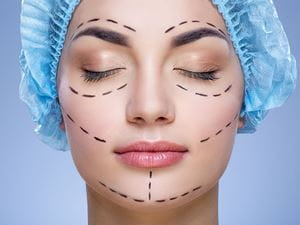
shutterstock.com
In response to this madness, the internet has been flooded with images of everyday men and women proclaiming that they love their imperfect bodies. Women with thick thighs post selfies with hashtags like “#LoveMyCurves” and “#NaturalBeauty,” and men share how a person who engages in a realistic workout regime can expect to look.
Unfortunately, this swarm of body positive bloggers sometimes goes too far. Many “helpful” body positivity social media pages declare that everyone everywhere should love their body exactly how it is and not want to change a thing about it! For the average person, this is great advice, but these bloggers often issue that same declaration to men and women who want to lose weight for health reasons. Being overweight, after all, is just as dangerous as being underweight.
Given the wildly contrasting extremes of social media and mass media, it is no wonder that teens everywhere are facing more body image issues than ever. Teens are developing eating disorders and engaging in dangerous diets at an alarming rate, but childhood obesity rates continue to swell. In this climate, how can a parent help their teen avoid developing a dangerous need to be skinny or disregarding the fact that they are unhealthily overweight? Here are some tips on how to teach your teen about body positivity.
Don’t Pretend Away Flaws
Children and teens are not stupid. They know that they have crooked teeth. They know that their new haircut looks really dumb. They know that their growth spurt has left them with skinny limbs that are still ungainly. They know that they put on some weight, why else do none of their pants fit? When your teen complains about how they hate their crooked teeth or how they’ve “gotten so fat,” resist the urge to reassure your baby that they are beautiful or perfect. No teen is going to be fooled by a parent’s declaration of “you have a perfect smile! What are you talking about?” when one of the teen’s front teeth came in sideways.Trying to pretend away the real flaws in a teen’s body will convince them that you aren’t listening. You don’t see their concerns as valid, and you probably didn’t even hear what they said. Congratulations. You have become the “stupid parent” in the eyes of a now sullen teen.
Being realistic about body image does not mean you should be cruel. If your teen has gained some weight and complains about it, offer to help them alter their diet so they can lose the weight. Yes, it is true that sometimes teens complain because they are fishing for compliments or want confirmation that they really aren’t fat. As the parent, you will have to be engaged with your teen to decide whether your teen is fishing for compliments or actually feels uncomfortable with their appearance. You will also have to judge whether your teen actually needs to lose some weight or is being taken in by impossible beauty standards.
Understand Their Perspective
One of the first rules for talking about anything with teens is to think about the issue from their perspective. Teens have very different priorities than adults and have a different set of life experiences. Since teens converse like adults and claim they want to be treated like adults, actual adults often forget that teens aren’t actually adults. That said, teens aren’t children either. Teens can reason and argue like adults, but their thought process can be incomplete and lack the experience that actual adults possess. For teens, acceptance by their peers is perhaps the most important thing in their life. Peer pressure is a concern for a reason, even if many parents have forgotten how desperately they craved the approval of their peers and the stupid things they may have done to get it.With this in mind, ask your teen why they want to change their body. To them, it might make perfect sense to shave their head since the most popular guy in school shaved his. They might not see anything odd about wanting to get a nose piercing so that they “fit in” with a new group of friends. To a healthy and well adjusted adult, these sort of rationales are nonsensical. You need to understand why they make perfect sense to your teen, though, before you can being to teach your teen some healthier responses than “monkey see, monkey do.”
Standards of Beauty Change
Teens aren’t always great at looking into the future. This is part of how some teens get into so much trouble. As such, your teen really might not have thought about the fact that beauty standards change dramatically in relatively short periods of time. When you have a good opportunity to begin a discussion about body positivity, such as when a celebrity posts an obviously altered picture, make sure you explain to your teen that standards of beauty change regularly. In the 1990’s, women were beautiful when they were waifish. In the early 2000’s, large breasts and bottoms were considered the most attractive. If your teen needs another example, you can point to trends in hair styles. Every few years, the standard of beauty cycles between long and short hair. If your teen does not match the current standard of beauty, that does not mean they will not fit it perfectly in two years.Encourage Health
Encourage your teen to think in terms of healthy choices. Help them understand that if they focus on having a healthy body, their appearance will improve without the dangerous side-effects that come with extreme dieting or weightlifting. A healthy body will naturally carry little fat, and a teen that eats healthy will have clearer skin.If your teen feels the need to lose weight, and they are overweight, help them find a healthy way to lose weight. Help them find a form of exercise they enjoy, and keep healthy foods in the house instead of junk foods. Make sure they avoid fad diets promising to help people lose weight fast. The healthy rate for weight loss is approximately two pounds per week.
Couch Consequences in Their Terms
One of the keys to getting teens to understand consequences is making sure the consequences are things that relate to the teen’s current life. A teen girl who feels she is fat won’t be swayed by declarations that starving herself can lead to organ failure. She will be dissuaded by reminders that starvation diets will leave her too weak to go to the prom. A teenage boy who wants to take steroids to bulk up won’t be worried about potential sterility. They will respond to the idea that bodybuilding too young will keep them from reaching their full height. Emphasize the consequences to a teen’s present reality or very near future. Damages that come “later in life” are easy for teens to brush off as “it won’t happen to me.” Things that endanger their chance to attend the concert next weekend are much better deterrents.Don’t Assume the Worst
If your teen wants to change their body, don’t assume the worst. “I want to lose some weight” doesn’t mean that your teen is suddenly going to start starving themselves. Don’t start wondering how you are going to afford a therapist for a teen struggling with severe body image issues when really your daughter just thinks her jeans are a hair too tight.The teenage years are when many people start to truly establish their own identity. They explore their own desires or sense of style, and deliberate body changes are part of that exploration. Your teen might want to lose a little weight to see if she looks better when she is a little thinner. She might also decide to gain a few pounds to see if her bottom will fill out her jeans better. Your son might want to start lifting weights to see if he likes the bulky look. He might also stop lifting because he thinks he looks better with a swimmer’s physique.
When accomplished through healthy means such as low-fat foods and exercise, minor body changes are no more dangerous than a teen deciding to grow their hair out “just to try it.” If you panic and assume the worst, you might actually create an issue that was not present. After all, if you freak out because he wants to bulk up a bit, he might begin to think that “gaining weight is bad.” Now you have a problem.
Teaching your teen about body positivity does not have to be a production. Talk to them like they are a rational human being, and work to understand why they are interested in altering their body. Make sure that you are displaying healthy body positivity yourself. If you are forever complaining that you are “so fat,” your teen is going to decide that they need to be skinny. Though teens never want to admit it, they copy what they see. Make sure what they are seeing is healthy and happy.

